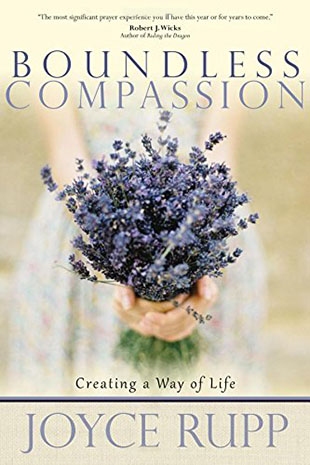Joyce Rupp is a master spiritual teacher of the Christian way whose 14 previous Ave Maria books have sold more than a million copies. A member of the Servite (Servants of Mary) community, she has characterized her ministry as that of being a "spiritual midwife." Rupp is revered as an inspiring retreat leader and conference speaker.
Boundless Compassion presents a six-week Christian guide to this spiritual virtue and practice. Rupp outlines how to use the book for individual study, group study, and with "Circles of Compassion." The program itself, like some of her other books (including two of our all-time favorites, The Cup of Your Life and Open the Door) includes daily material, organized around a weekly theme, with an essay, a reflection, a prayer, and a scripture to carry in your heart during the day. Each week's material includes examples of how to enter into situations that contain travail and difficulty. Rupp explains: "This requires being in touch with how we think, feel, and respond to the suffering residing in ourselves and others, and how we interact with the extensive differences that trouble our world."
Rupp researched this program as co-director of the Servite Center of Compassionate Presence with Sr. Margaret Stratman. In the introduction, she states:
"There is nothing wimpy or starry-eyed about this essential Christian virtue. Living compassionately is rarely convenient and often downright challenging. It requires a willingness to pay the price for being aware of suffering and doing what is possible to diminish it."
She holds up Jesus and St. Francis as bold and faithful models of compassionate living. What is the greatest challenge of this way of life? — "recognizing the dignity and worth of every person — regardless of race, gender, creed, political stance, or personal behavior. The light of divinity dwells within each one, no matter how hidden that goodness might be."
After taking a brief look at Awareness, Attitude, and Action as the three essentials animating the movement of compassion, Rupp outlines four main spiritual qualities which must be nurtured for the sake of compassion's growth: nonjudgment, nonviolence, forgiveness, and mindfulness.
To ease the suffering of others, to come to the aid of those who are vulnerable and hurting, to serve those who are battered and tormented by domination and oppression, and to not succumb to compassion fatigue, we must develop and practice a diligent program of self-compassion. Again Jesus demonstrates what this means.
Hitting high stride, Rupp delineates the beautiful shapes and bounties of compassion as a river of suffering, a transformation from hostility to hospitality, a loving presence, a reverence for our common humanity, patient fortitude, reaching out to others with empathy, and carrying hope in our hearts.
The practice of compassion, Rupp demonstrates over and over again, does not have to be complicated: "Every thought, word, and deed contributes to strengthening compassion. Every facial expression, too, holds the possibility of lessening suffering." She includes many stories, some personal and others gleaned from conversations and reading, to illustrate how people are acting with compassion in their daily lives. Refreshingly, although she describes this program as a way for Christians to incorporate compassion into their spiritual life, she draws upon writings by teachers from other traditions, including Pema Chodron, Christina Feldman, Gail Straub, and Kristin Neff. This gives the book a universal appeal.
Boundless Compassion: Creating a Way of Life by Joyce Rupp is brimming over with fresh and cogent insights, practices, exercises, and other resources on compassion as a spiritual way of life.
